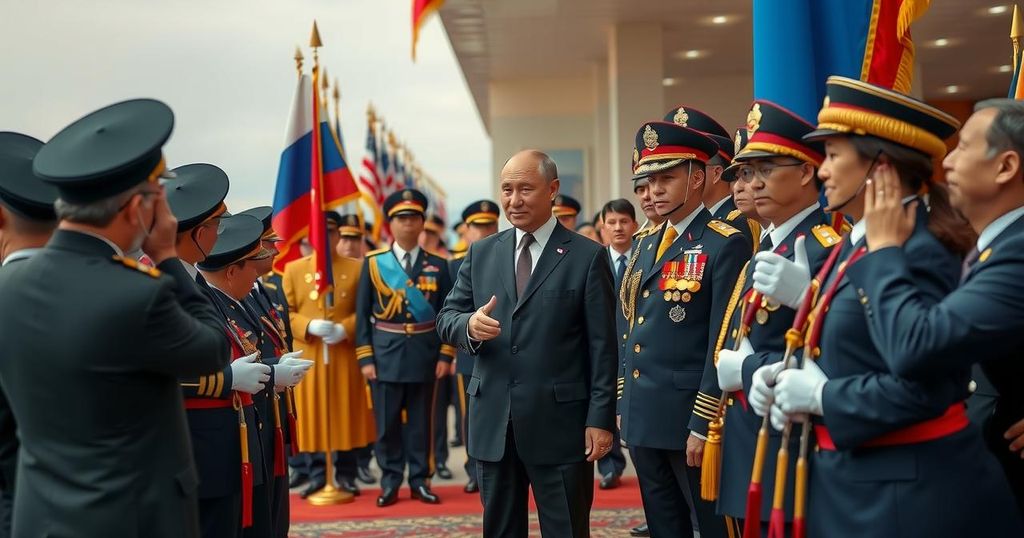Mongolia has welcomed Russian President Vladimir Putin despite international calls for his detention due to war crime allegations. His visit, met with both ceremonial honors and protests, raises questions about Mongolia’s compliance with the ICC and its ability to balance relations between Russia and China without compromising international law. The visit coincides with significant historical commemorations, further complicating Mongolia’s diplomatic stance.
Mongolia has extended a warm welcome to Russian President Vladimir Putin during his recent visit, despite international calls for his detention due to alleged war crimes related to the illegal deportation of Ukrainian children. The reception occurred in Ulaanbaatar, where President Ukhnaagiin Khurelsukh warmly greeted Putin at the iconic Sukhbaatar Square, amidst a ceremonial display that included military music and national anthems from both nations. This visit, characterized as a assertive diplomatic gesture by Mongolia, raises concerns regarding the country’s adherence to international law and its relations with larger neighbors, particularly as it has abstained from condemning Russia’s actions in Ukraine.
Putin’s arrival has generated substantial global attention, with the International Criminal Court (ICC) reiterating that its member states have obligations to detain individuals wanted by the court. The reluctance of Ulaanbaatar to act against Putin has prompted criticism from various quarters, including Ukrainian officials and European Union representatives, who have expressed disappointment that Mongolia chose not to comply with its obligations under the Rome Statute. In response, the United States has acknowledged Mongolia’s difficult position between powerful neighbors and hopes that the country will uphold the principles of international law.
Historically, Mongolia has walked a diplomatic tightrope since the dissolution of the Soviet Union, maintaining close cultural and economic ties with both Russia and China. Given the significance of these relationships, some local citizens, such as economist Altanbayar Altankhuyag, voiced support for the government’s decision not to arrest Putin, citing the importance of stability and friendship with both neighboring powers. Protests have occurred in response to the visit, but authorities took steps to limit dissent, emphasizing the complex balance of support and criticism that Mongolia navigates in its foreign relations.
The recent visit of Vladimir Putin to Mongolia occurs against a backdrop of heightened scrutiny and accusations of war crimes by the International Criminal Court (ICC). Mongolia, a small democracy situated between Russia and China, seeks to balance its historical ties to Russia with its economic partnership with China. It has not condemned the Russian invasion of Ukraine and has abstained from votes on the matter at the United Nations. This visit marks Putin’s first to Mongolia in five years and coincides with an important anniversary of a historical military victory. The actions of the Mongolian government during this visit raise significant questions about its international obligations and the potential implications for its diplomatic relations.
In summary, Mongolia’s warm reception of President Putin during his controversial visit illustrates the delicate diplomatic balancing act the nation performs between adhering to international legal obligations and maintaining critical relationships with formidable neighbors. As the global community watches, the implications of Mongolia’s actions regarding international law compliance and its stance on Russian aggression will likely continue to be a focal point in discussions surrounding the country’s geopolitical identity and operational integrity.
Original Source: www.channelnewsasia.com







